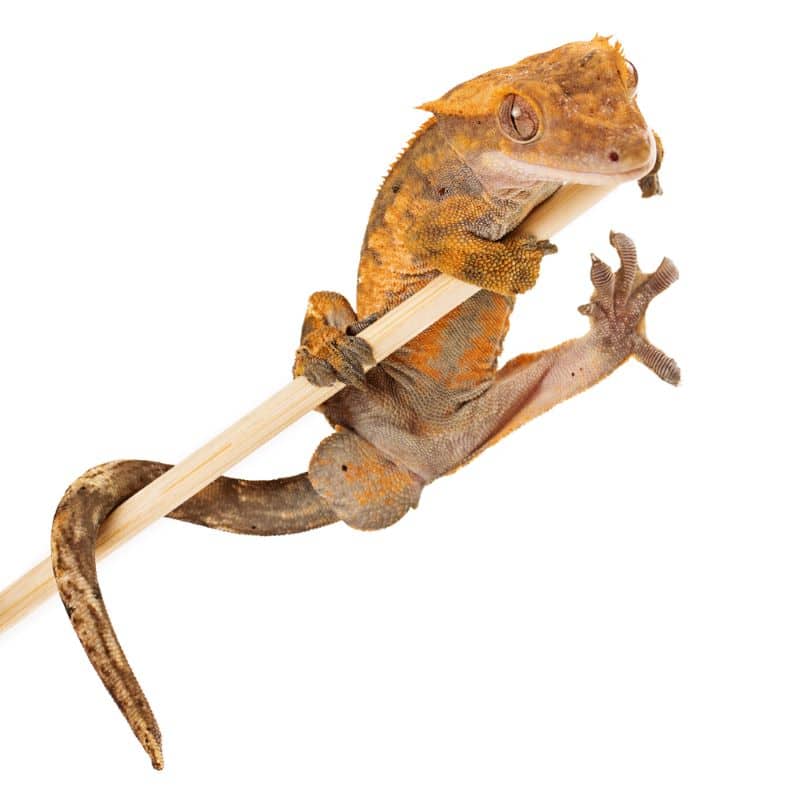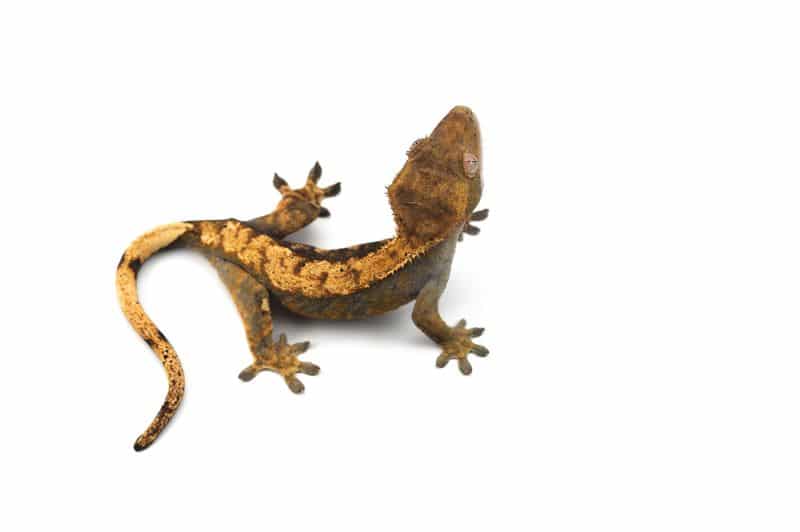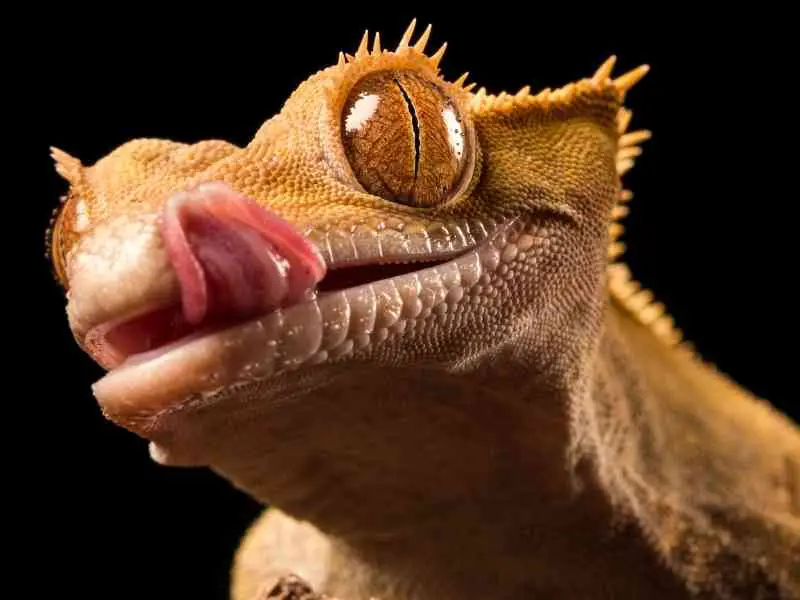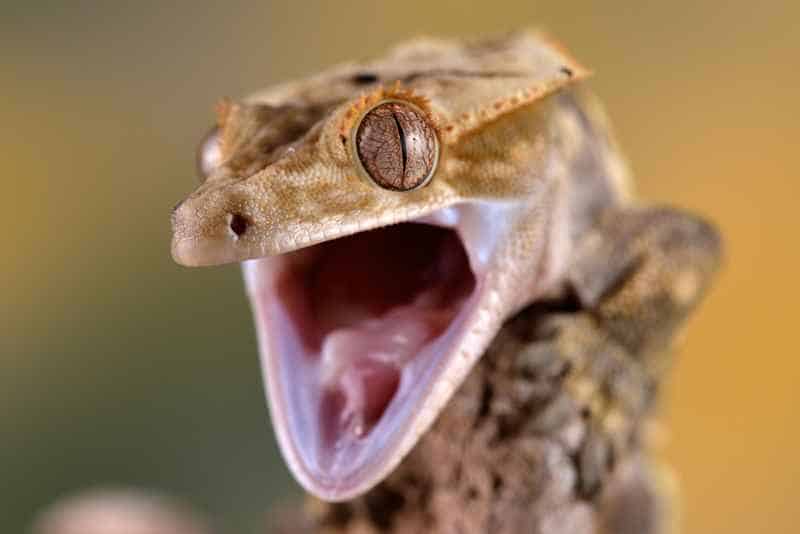Crested Gecko Parasites: Care Guide & Questions Answered
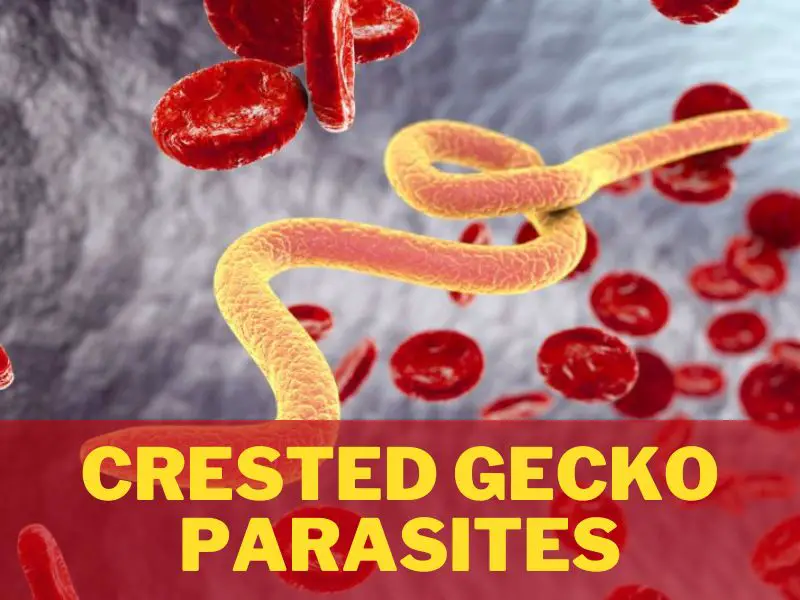
Caring for your Crested gecko takes a little bit of a learning curve, at first. You want that temperature to be around 72 – 75 degrees Fahrenheit in their enclosure, there needs to be some quality lighting, and live plants will give your gecko plenty of places to climb and hide – but what about parasites?
Anytime you’ve got a warm environment, live plants, and equally live food too, then you’ve also got a potential for bacterium and even the accidental introduction of certain parasites.
Today, we’re going to explore these in-depth so that you’ll be better prepared to recognize symptoms and signs that these dangerous organisms might be at play. We’ll also go into treatments, why quarantining is a must, and even some prevention strategies.
Without further ado, let’s talk about Crested geckos and the parasite that tend to target them!
Contents
Can Crested geckos get parasites?
Crested geckos can indeed get parasites, just like any other living creature. On the bright side, as they are born and bred in captivity, this is less of a worry than it would be with many other types of lizards.
While you can and definitely should adopt immaculate cleaning standards and ensure a healthy diet for your gecko, even this is sometimes not enough. Adding another gecko, an unseen and unhygienic incident in the enclosure, or even parasite feeder bugs can and occasionally do result in a parasitic infection.
With that in mind, let’s take a look at the most common ways that your Crested gecko can end up with a parasite and we’ll move on from there.
How do they get them?
How your Crested gecko ends up with parasites in the first place will depend on the type. As far as external parasites, you typically only have to worry about mites, and they end up on your gecko when you introduce a new lizard to them without a proper quarantine period first.
Wild-caught and imported lizards are the most common source for this, but mites can find and pester just about any reptile, and even lay eggs in the enclosure. Don’t worry – we’ll tell you what to do about these shortly – just stick with us!
As far as internal parasites, these can be passed along through infected feeder crickets or from other low-quality foods, and parasites may also be transmitted through contact with another infected gecko.
With Crested geckos, it’s actually not a very large list – parasites tend to be specialized – but there are definitely some out there that can make your gecko very ill or worse!
Types of internal parasites
For internal parasites, the biggest culprits that you need to work for basically fall into 3 categories. They break down into:
- Bacterium
- Protozoans
- Worms
For instance, with bacterium, one good example would be salmonella, and it’s not uncommon for this to be living in the gut of your gecko. The good news on this is that the salmonella won’t harm, but there’s a caveat—it’s still dangerous to YOU!
This means that you can’t snack while playing with your gecko and whenever you are cleaning the cage, it’s very important not to use your kitchen sink. Salmonella can easily be spread to your dishes and those affected may experience diarrhea, fevers, and stomach cramps – this is easily avoided, so don’t forget about salmonella.
Cryptosporidium is another concern, and this is a type of protozoan that can affect your Crested gecko, but unlike salmonella, this can definitely make them very sick or worse.
As far as worms, pinworms and roundworms are the most common, and they can wreak havoc with your gecko’s digestive system. They will sometimes be visible in your gecko’s droppings, so keep an eye out when you clean the age for any abnormalities in their droppings.
Where are external parasites commonly found?
External parasites, such as mites, may be found just about anywhere on your gecko’s body. They are quite tiny, with red mites being the easiest to spot, and you should give your gecko a thorough looking-over if you suspect that there might be mites in their enclosure.
Check their jaw and chin and look for any abnormalities there or on the rest of their body. Sometimes a suspicious bump on the skin might well be a mite and if you have a magnifying glass, then you should definitely use it.
This will make them much easier to spot and then once you’ve confirmed the mites, then you’ll be ready to take the next steps that we’ll give you in our upcoming sections.
With internal parasites it’s much harder to spot beyond the symptoms, though checking their fecal matter can give you a clue with some protozoans and with worms. For instance, with Cryptosporidium, you will see green in your Cresty’s urates and poos.
Small amounts might be present at the beginning of such an infection, but the greener that is present, then the longer it has progressed – get your vet involved immediately!
Worms are probably the easiest to spot, since your gecko’s fecal matter is normally a dry pellet. Look for small abnormalities that resemble tiny strings or streaks in the matter and if you see them, then most likely you are dealing with worms in your lizard’s digestive system.
Symptoms that your Crested Gecko has parasites
As internal parasites will be hiding inside your gecko, you’ll need to know what kind of symptoms to look for in order to determine if parasites might be at play. One sign of this can be a thinning tail.
As your gecko stores energy in the form of fat in their tail, a parasitic infection that is drowning them of nutrients is also going to draw on these fat reserves, and visible weight loss throughout the body is also a tell-tale sign that a parasite might be sapping their nutrients.
Your gecko may also vomit from time to time, as this is another common symptom, and their droppings may well be runny or colored different. With Crested gecko droppings, typically one half should be brown, while the other half will be clear once expelled, but dries into a chalky white.
Any deviation from this might well indicate that a parasite might be present, so it’s a very good idea to get the veterinarian involved as your gecko’s health may quickly take a turn for the worse.
Are these parasites fatal?
You always want to get treatment for your Crested gecko if you suspect parasites. By nature, they are designed to live off their hosts, and over time this could indeed prove fatal for your gecko. By draining nutrients from their food, what basically occurs is a slow malnutrition, a depletion of the fat stores, and gradual weakening of your pet.
As you get to know your gecko, however, telling when something amiss will be a lot easier. If you see that they are lethargic, losing weight, or notice abnormalities in their droppings that last longer than 2 – 3 days, then it’s likely that they are ill and parasites are one of the most common culprits of this.
The good news is that this sort of thing is quite treatable, provided that you get them assistance as soon as you notice that there is a problem.
The only exception is rare instances of viruses, fungi, or Cryptosporidium, but even then, if you notice early then your gecko is going to have the best chance at treatment or management of the parasites.
Treatment options
Mites are the easiest to treat and it’s something that you can do at home if you are comfortable with the process. A magnifying glass can be helpful, but a cheap pair of reading glasses gives you more mobility to deal with these little pests.
With a cotton ball, dipped in alcohol or in oil, you can gently remove the mites and commercial sprays are also available. You’ll want to clean the enclosure very thoroughly as well – mites lay eggs, and simply putting your gecko back into an uncleaned cage will quickly result in a resumed infestation.
For internal parasites and other infections, antibiotics are common, especially with respiratory symptoms present that are making breathing more difficult for you gecko. Panacur is quite often used for treating worms, although other dewormers (also called anthelmintics) may be required, depending on the specific type of worms.
As with mites, thorough cleaning of your pet’s enclosure will be required to ensure that they are gone.
For cryptosporidium, your vet will likely use a treatment of paromomycin, as this should reduce the number of parasites, but this parasite is unfortunately very hard to get rid of. Your vet will need to assess your gecko’s current condition in order to give you a better idea of what may be done next.
The importance of quarantining as-needed
If your Crested gecko is sick, then they need to be separated from your other geckos or other lizards that may be nearby. A separate enclosure, kept well-away from the rest, is going to be vital to help ensure that parasites do not end up being transferred to other lizards or other enclosures in the house.
Clean your hands thoroughly with hand sanitizer after handling any lizard (but especially with a sick one) and don’t forget that you can’t clean anything from their enclosure in your kitchen sink.
While parasites tend to be specific to certain hosts, bacterium such as salmonella can certainly spread – so until you know exactly what is affecting your gecko, it’s best to play things safe. During this time, you should also do any cleaning of the ‘infected’ enclosure in its own separate space.
That way, you won’t risk cleaning items from other enclosures in the same space and potentially contaminating them as well.
Preventing parasitic infestations
Taking a proactive approach is always going to be their best and there are a few good habits that you can get into that will help reduce the chance of parasitic infections. One good habit to develop is quarantining any new lizards for a brief period before introducing them to the others.
Skipping this step is a bad idea, as until you’ve observed the new lizard for a while you can’t really be certain that they are healthy.
You’ll want to observe them for a few days and look for any symptoms such as lethargy, vomiting, a thin tail, or any abnormal droppings and be sure to deworm them as well. If they seem okay after a few days, then you can begin the introduction process with confidence and everything should be okay.
Beyond this, you’ll want to make sure that you have a regular cleaning schedule and that it runs like clockwork. This alone will go a long way toward keeping your gecko healthy and you should also get a thermometer sticker or other means of gauging the temperature in the enclosure.
Crested geckos are most comfortable at 72 to 75 degrees, but if it’s any warmer then it’s not good for your gecko’s health. While they can take a temperature of up to 80 degrees for short periods, this is dangerous for them, so you want to keep it at 72 – 75 at all times.
Also, as Crested Geckos require a humidity of around 60 -70%, conditions in the enclosure will be more comfortable for certain types of bacteria – another area where the cleaning is going to be vital — and it’s a good idea to have a ‘dry out’ period every now and again, as well.
Frozen crickets and other insects are going to most likely be parasite-free, though keep in mind that your gecko might not want to eat them and even with the risk, live food is generally going to be considered best.
Finally, regular vet visits are going to be the final piece of the puzzle. Your veterinarian can check their overall health, deworm as necessary, and if you are worried about a parasite then they can certainly test for it right away.
Some closing comments on parasites and your Crested gecko
Today we’ve talked about Crested geckos and the common parasites that you’ll need to look out for. With external parasites, you’ll generally just be looking for mites, and worms will often show up in your gecko’s droppings, so you’ll want to examine these when you are cleaning their enclosure.
For most internal parasites, however, you’ll need to watch for symptoms, such as sluggish behavior, vomiting, liquid consistency or color change in droppings, or any changes in appetite. If you see any of these or suspect that your gecko might well be ill, then don’t hesitate to visit your veterinarian.
When it comes to your Crested gecko’s health, it’s always best to err on the safe side!
